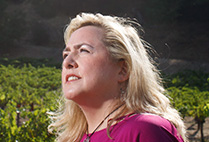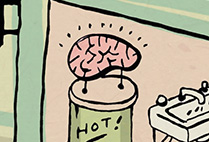In The Wired City: Reimagining Journalism and Civic Life in the Post-Newspaper Age, media critic Dan Kennedy offers an optimistic take on the future of journalism, largely reflected in the story of a New Haven, Conn., daily news website and its feisty founder and editor, Paul Bass. With seemingly unlimited access, Kennedy brings the reader into the New Haven Independent’s “newsroom”—a café across from its hole-in-the-wall rented office—and out in the field with a handful of passionate, multitasking reporters. He travels to upstate New York and San Diego for contrasting looks at local online news operations that seek, with varying success, to give broader, profitable outlets like Yahoo! and AOL a run for their money.
Money, and the persistent need to raise it, casts an ominous shadow over these websites’ success. Run as a nonprofit, the Independent is kept alive through ever-shrinking foundation grants and the generosity of community leaders and philanthropists. The pay is predictably on the low side, but the staff receives a generous health plan. A journalism professor at Northeastern University, Kennedy (MET’84), who earned a master’s in American history at BU, sees sites like the Independent as daily cyberincarnations of the now largely defunct alternative weeklies (the site is named for such a paper, which Bass ran in the early ’70s). Can quality online community journalism survive? Yes, with persistence and resourcefulness, concludes Kennedy in The Wired City (University of Massachusetts Press, 2013).
A former media columnist for the Boston Phoenix, Kennedy received the National Press Club’s Arthur Rowse Award for Press Criticism in 2001. His blog, Media Nation, tracks issues related to journalism, politics, and culture. Bostonia spoke with him about whether the death of journalism has been greatly exaggerated and the challenge of telling a story that is in perpetual flux.

Kennedy says he made the Independent the focus of his book in part because it was doing ambitious journalism. “I’ve always had a passion for local journalism,” he says. “It’s where I got my start, and it seemed to be a good example to focus on an innovative, nonprofit, online-only outlet.”
Bostonia: With so many daily news websites, tell us about your decision to focus on the New Haven Independent.
Kennedy: My original idea was to do a book on a wide range of online journalism projects. The Independent was on my radar, and I thought it might be a chapter or even part of a chapter. But after a month of doing research and reporting, I felt drawn back to New Haven as an anchor for the book. The Independent was doing ambitious journalism, it’s an interesting place, Paul Bass was interesting, and by focusing on him and his paper, it could be more of a narrative work. I’ve always had a passion for local journalism. It’s where I got my start, and it seemed to be a good example to focus on an innovative, nonprofit, online-only outlet.
What are the challenges of writing a book about a subject that changes by the day?
This provided a good and interesting challenge. How do I write something that’s going to hold up for a few years? I knew the Independent would still be around in a few years. I was scrambling to incorporate some big changes, like the daily print New Haven Register going bankrupt, but I generally wasn’t hugely concerned about how things were going to hold up.
To keep a website like the Independent alive, don’t you need a rare, almost obsessed driving force like Paul Bass?
The Independent would be unimaginable without Bass. I do think that, yes, you need that special entrepreneurial journalist to make it happen. Smaller projects do depend on personal leadership, but some are more organizational. These websites are not that different from mom-and-pop weekly newspapers.
Do you believe there will always be a place for print?
In the foreseeable future, yes. But it will be a luxury item. Look at what the Boston Globe has done. They’ve said, if you want print we’ll give you print, but you’re going to pay a lot for it.
It seems that destination news sites—those you would habitually visit, the way you would read a morning newspaper—are becoming outdated. Can you comment on the difference between the ways the generations consume news?
I do almost all my news reading online, and yet I still approach it as, now I’m going to read the New York Times, now the Globe. That isn’t how young people are consuming news. They’re coming at it from all different directions. That’s where a niche publication like the New Haven Independent has an advantage over a general service newspaper. In this postindustrial age, there’s no reason for any one publication to have international news, the funnies, sports. It doesn’t make any sense. The Independent is focused on a fairly small city. If it happens over the border in Hamden, they’re not going to cover it. The Register is stuck with still trying to appeal to a broader audience.
Do you think that relatively low-paying community journalism has any appeal for young people entering the field?
I teach journalism, and I don’t get the impression that many of my students want to do local community journalism. They want to do fashion and sports, but there are certainly a few who are interested in local community journalism, and venues like the Independent are a good place for them. But the old career ladder, the idea of moving up and up and up, just doesn’t exist anymore. I do wonder if we’re returning to a more traditional vision of community journalism. There’s always going to be a need for great national and international reporting, but there won’t be places to do it.
Your book seems to lean toward the nonprofit model as the way to go.
When Bass started the website, he looked at the for-profit model and said that selling advertising is too much work. As a nonprofit you’re getting huge chunks of funding. But the IRS has put the clamp down on nonprofit journalism, rejecting applications for nonprofit status. It’s hard to know why. Some investigative news sites have received nonprofit status, but the IRS told them that they need to take the word “journalism” out to gain approval. But if local nonprofits are able to tap into local money, that’s more sustainable. Donors can’t make guarantees, but they seem to understand that strong local journalism deserves ongoing funding just as much as funds for poor mothers and the local orchestra. Certainly public radio has proven to be sustainable.
You spent so much time with Bass and clearly came to admire him. Did that ever create a conflict or threaten your objectivity?
It’s very tough when you’re covering somebody very closely like that. I never stayed at his house. I always stayed at a hotel, although I’ve accepted his dinner invitations on a number of occasions and I’ve taken Paul and his wife out to dinner as well. This is someone I admire. It was nevertheless an independent effort. He had no say in what I was going to write. At the very end, I gave him a chance to fact-check the galleys, but he understood, if you don’t like the book, that’s too bad.
What kind of feedback have you been getting?
People get passionate about this subject. The first talk I gave on the book was for retired Northeastern alumni, who were pretty elderly. What I loved about it was that this was the last generation that was addicted to reading newspapers. They were very skeptical about this online thing.














































Related Stories
Long Live the Daily Free Press
Famous friends among those donating more than $70,000 to save student newspaper
Changes Ahead for the Daily Free Press
BU’s student newspaper will print once a week, redesign website
Live from BU, It’s Pals & Friends
Sketch comedy show latest on BUTV10’s lineup
Post Your Comment